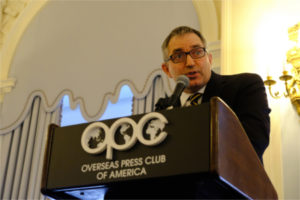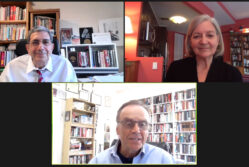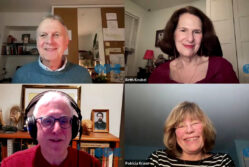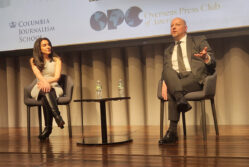Event Coverage Highlight

C.J. Chivers Tells OPC Scholars to ‘Stick to Basics’
by Chad Bouchard
[Scroll to the bottom of this page to watch a playlist of video clips from the program’]
The Overseas Press Club Foundation presented 16 scholarship awards at the organization’s annual Scholar Awards Luncheon on Friday, Feb. 22, 2019, at the Yale Club.
OPC Foundation President Bill Holstein said during his opening remarks that the organization is joining a global battle by launching the careers of journalists’ who share key values of integrity and hard work.
“We’re fighting against the forces of isolationism, against a sort of national navel-gazing that’s going on today. We’re fighting against all the bullies and thugs around the world, including here at home,” Holstein told the capacity luncheon crowd.
C.J. Chivers, Pulitzer Prize-winning correspondent for The New York Times, was the keynote speaker. He began by rejecting what he called a cliché descriptor of journalism as merely “bearing witness,” and called on the scholars to instead “validate and lift the suffering of people who are in the way and trod upon. You can expose, indict and shame the powerful, the ignorant and the abusive. And you can explain, if you’re smart, the most pressing problems of modern times to your fellow citizens with sound analysis and compassion.”
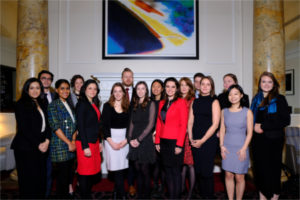
Left to right: Mehr Nadeem, A.J. Naddaff, Krithika Varagur, Rachel Mueller, Sarah Champagne, Rebecca Redelmeier, Jonas Ekblom, Daphne Psaledakis, Sarah Wu, Letícia Duarte, Audrey Gray, Eli Binder, Emma Vickers, Claire Parker, Echo Wang and Rebekah Ward. Photo: Sangsuk Sylvia Kang
He reminded scholars to “stick to basics,” and to “remember that very little that’s good rises from weak roots.”
This year’s winners included six from Columbia University, two from Harvard, and one each from Yale, Brown, Tufts University, UC-Berkeley, University of Missouri, UNC-Chapel Hill, SOAS University of London and Davidson College. Each recipient spoke briefly about their future goals and past reporting, sharing stories from the field.
This year’s Harper’s Magazine Scholarship in Memory of I.F. Stone went to Letícia Duarte, who followed a Syrian refugee family for seven days from Greece to Germany across eight countries to escape civil war. She recalled one refugee telling her that “most journalists just ask a lot of questions and then leave. But you stayed with us. You didn’t have to, but you are going through this with us,” she quoted the man saying, “your story will be different.” Duarte has an OPC Foundation fellowship with the GroundTruth Project. “I want to give visibility to invisible realities,”she said.
This year marked the launch of the first Richard Pyle Scholarship, which went to A.J. Naddaff, a student at Davidson College with reporting experience in the Middle East, North Africa and Kosovo. The award’s namesake spent 50 years at The Associated Press. In presenting the award, OPC member and veteran AP reporter Edith Lederer remembered when Pyle was her boss as Saigon bureau chief while she covered the Vietnam War. She called Pyle “a brilliant wordsmith who never lost his passion for pursuing important stories and ‘the truth.’” Naddaff said in his remarks that during his time reporting on ISIS in Kosovo, he learned that “pushing through fear creates the best stories.” Naddaff will head to Beirut for an OPC Foundation fellowship with the AP.
Rebekah Ward, winner of the Walter and Betsy Cronkite Scholarship, talked about her experience as a reporter and field producer for France 24 in Colombia where she covered killing and violence against women in the aftermath of the 2016 peace treaty in the formerly occupied FARC areas, which still lack strong governance. She said she wants to continue digging deeply into stories and showing connections across the Americas, rather than covering stories isolated from context. “That’s an advantage of the journalism we’re seeing today. We’re not reporting on places like they’re silos anymore.” Ward is a graduate of Colgate University and speaks professional French and Spanish, and has dual citizenship in the U.S. and Canada. She has an OPC Foundation fellowship with Reuters in Mexico City.
Emanuel R. Freedman Scholarship winner Echo Wang recounted working from Shanghai on a report about honey bee pollination in China, when she called a farmer in a remote village on the Tibetan plateau for comment in La Monde. She explained that he called her a liar and quickly hung up. The incident has stood as a reminder to ask herself to prepare properly for stories, to try to understand the lives of sources, to go to places where news is happening rather than cover remotely by phone. “I am so grateful for being a journalist, which allows me to walk into the lives of other people, and to lean about different parts of the world.”
Irene Corbally Kuhn Scholarship winner Mehr Nadeem spent 10 years growing up on an expat compound in Saudi Arabia. In her remarks, she spoke about how the constant threat of terrorist attacks created a claustrophobic atmosphere in the compound. The piece she submitted for the scholarship was a long-form investigation into a security and surveillance partnership between Saudi Arabia and the University of New Haven. “I’m drawn to this profession for its relentless commitment to breaking boundaries, both physical and intellectual,” she said.
The Nathan S. Bienstock Memorial Scholarship went to Audrey Gray, a graduate of the Columbia University Graduate School of Journalism. Gray is focused on long-form journalism about the impact of global climate change. She spoke about reporting on the effects of climate change in Senegal, where traditional seasonal rains have become so torrential that they spark floods and wash away fertile soil. Gray said she was moved by the prayers of those she talked to for the story. They prayed for her safety, and prayed that the story would make something happen. “Most stories about climate change are pretty awful. They are constipated with numbers that none of us quite understand,” she said. She credited her teachers at Columbia for reinforcing that good reporting means “you get your body there, you observe, and you write something that makes people feel a [certain] way,” she said. “My intention is to use the years left that I have to work to write stories that make you feel something, to answer the prayers of these women, for whom the stakes could not be higher.”

